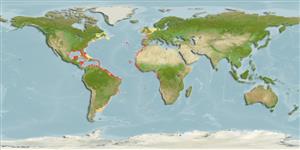Preferred temperature (Ref.
115969): 19.6 - 28, mean 27 (based on 1409 cells).
Phylogenetic diversity index (Ref.
82804): PD
50 = 1.0020 [Uniqueness, from 0.5 = low to 2.0 = high].
Bayesian length-weight: a=0.01023 (0.00419 - 0.02501), b=3.02 (2.81 - 3.23), in cm Total Length, based on LWR estimates for this (Sub)family-body shape (Ref.
93245).
Trophic level (Ref.
69278): 4.5 ±0.0 se; based on diet studies.
устойчивость к внешним воздействиям (Ref.
120179): низкий, минимальное время удвоения популяции 4.5-14 лет (K=0.07-0.10; tmax=55; Fec>1 million).
Prior r = 0.34, 95% CL = 0.22 - 0.51, Based on 1 data-limited stock assessment.
Fishing Vulnerability (Ref.
59153): Very high vulnerability (76 of 100).
Climate Vulnerability (Ref.
125649): High to very high vulnerability (67 of 100).
